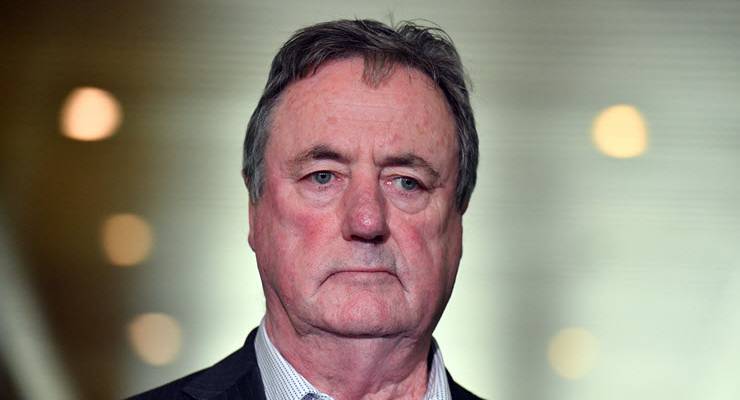
If there weren’t already doubts about the government’s commitment to setting up an anti-corruption watchdog, this week’s revelations about former Australian Federal Police (AFP) chief Mick Keelty confirm just how fraught the process has been.
Keelty was revealed to have tipped off former special forces soldier Ben Roberts-Smith about a war crimes investigation in 2018 into the Victoria Cross recipient, compromising one of the most sensitive probes in AFP history.
Keelty claims not to have known Roberts-Smith personally, but passed on confidential information given to him by his ex-colleagues out of concern for Roberts-Smith’s welfare.
The revelation is shocking, not only because Keelty is one of the most high-profile law enforcement figures in the country, but because he was advising the Morrison government on anti-corruption matters at the time.
The tip-off resulted in Keelty becoming the subject of an investigation by the Australian Commission for Law Enforcement Integrity (ACLEI). This meant that the person advising the government on how to investigate corruption was at the same time the subject of a corruption investigation.
Attorney-General Christian Porter rushed to Keelty’s defence, saying he provided “valuable insight” into the structure of a new integrity commission and that Porter was not aware of the ACLEI investigation.
The revelations show not only the urgent need for a national anti-corruption body, but just how tainted and inept the government’s efforts to set one up have been.
Watered-down version of ICAC
Prime Minister Scott Morrison announced in December 2018 that he would introduce a Commonwealth Integrity Commission (CIC) after earlier dismissing the concept as a “fringe issue”.
Porter immediately brought in Keelty to advise on how to set it up.
Porter’s advisory group included former senior Western Australian public servant Mal Wauchope and former NSW crown prosecutor Margaret Cunneen.
Cunneen has been a staunch critic of the NSW anti-corruption watchdog since she won a High Court case preventing it from investigating allegations she perverted the course of justice after a car accident in 2014. She has called its powers “extraordinarily draconian”.
“The group that Christian Porter set up to advise him was ridiculous,” Stephen Charles, a former Victorian Court of Appeal judge and director of the Centre for Public Integrity, told Crikey.
“But that’s only at the base of the problem. Porter has set up a body that quite deliberately does not have the power to investigate [corruption issues such as] sports rorts.”
The government’s proposed commission has not materialised, and has been widely criticised as being a watered-down version of ICAC and a “sham”. The commission would hold no public hearings and refer all recommendations to prosecutors, who would decide whether to go ahead with the case.
Monash University senior law lecturer Dr Yee-Fui Ng said the government’s appointments to the advisory panel showed just how inclined the government was towards a weaker model, “which is what they came up with”.
“They wanted to protect individual rights from being wrongly accused and people’s names dragged in the mud,” she says. “But if you go too weak, that comes at a cost to the effectiveness of the body.”
Pandemic makes credible watchdog even more important
Porter said in a statement that Keelty was selected because of his “extensive experience in law enforcement” and understanding of the organised crime and corruption landscape.
“The panel provided valuable drafting insights to government during the time of its operation,” he said.
But questions remain about his appointment, and what came of the police watchdog’s investigation into the leak.
In May Porter said an exposure draft for the commission had been ready for release before the pandemic but had been delayed because of the urgency of the COVID-19 response. He said the government was still committed to establishing the CIC and that draft legislation would be released “at an appropriate time”.
But Ng said the pandemic made a credible watchdog more urgent, given the government was spending billions of dollars on a recovery.
“The integrity issues in government haven’t gone away,” she says. “There is still rorting of expenses, issues of improper use of funds; there is still a pressing need for a federal watchdog.”
Does Australia need a strong anti-corruption watchdog? Let us know your thoughts by writing to letters@crikey.com.au. Please include your full name to be considered for publication in Crikey’ s Your Say column.








Crikey encourages robust conversations on our website. However, we’re a small team, so sometimes we have to reluctantly turn comments off due to legal risk. Thanks for your understanding and in the meantime, have a read of our moderation guidelines.